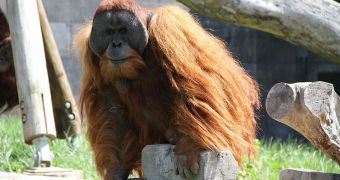A new series of scientific experiments demonstrate that orangutans can literally copy new information from each other. They also learn new things and abilities just by watching how other member of their species do them, which is something that has not been confirmed in other species before.
Humans are good at doing things they've never experienced before, if they at least saw them being performed by others. In some ways, this is how we educate young ones in schools. Teachers show students actions and experiences, but not all students are involved directly.
In other words, seeing an action being performed ranks very close to actually carrying out that action directly. Until now, experts believed the trait was uniquely human, but a new study proves otherwise.
In carefully-designed experiments, orangutans were shown to be perfect copycats. After observing one of their own perform a certain action, they were able to reproduce it with great precision, even if they had never been put in that situation before.
The new studies were conducted in a setup where a box with a sliding lid on it was placed on the bars of a cage containing several orangutans. The idea was that, every time the animal managed to open the door – regardless of the method they used – they got a treat.
“One of the questions that we were looking at is how individuals learn from one another,” explains team leader Marietta Dindo, who is a primatologist studying orangutans and their behavior. Her team carried out the study in an enclosure at Zoo Atlanta.
The US National Science Foundation (NSF) provided the funding needed for this research. This study included 13 orangutans, which the experts used to study the primates' transmission chain.
“I tell you something, then you tell him something and so on, how does that information then pass on? We wanted to see whether or not these orangutans would learn,” Dindo says of the “chain.”
“What's interesting and unique about orangutans compared to humans or even other great apes is the fact they're what we call 'solitary but social,' which means that the individuals, aside from a mother-offspring interaction, will only have limited times where they spend in affiliation with other orangutans,” she says.
These primates have now been proven to employ similar tactics to humans in getting a desired result. The difference is that they do not over-imitate in order to obtain the same exact outcome.
“Is it intelligent to be as others – when it's so integral to our society and the cultural norm is to do as others do? Well, then yes, it's very smart,” Dindo says of the orangutans.
“But if you're not going to want to waste your resources and you want to get to your food fast, then that, too, is very smart. So it really depends on where you're coming from,” she concludes.

 14 DAY TRIAL //
14 DAY TRIAL //